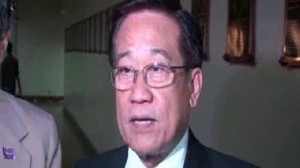‘No-show’ justices may be violating law for skipping flag-raising rites at SC — lawyer
MANILA, Philippines — A lawyer said on Sunday the repeated absences by some justices of the Supreme Court from the regular Monday flag raising rites of the high court might constitute a grave violation of the country’s flag law.
Lawyer Romulo Macalintal added that Supreme Court justices should attend the Monday flag-raising ceremonies because the Supreme Court issued Circular No. 62-2001 on Sept. 21, 2001, directing all executive judges to supervise the holding of the flag rites in their courthouses and “shall ensure the attendance of all judges and court personnel in the rites.”
Macalintal pointed out that Section 18 of the Republic Act No. 8491 or the 1998 Flag and Heraldic Code of the Philippines has provided that “all government offices and educational institutions shall observe the flag-raising ceremony every Monday morning” while Section 2 has mandated that “reverence and respect at all time shall be accorded the flag (and) the anthem.”
Section 50 of the same law provides that a violator of the law “shall be punished by a fine of not less than P5,000 or imprisonment for not more than one year; provided that for any second or additional offenses, both fine and imprisonment shall always be imposed.”
While Macalintal does not see the justices being impeached for perennial absences in the flag rites, he said non-attendance “may create the wrong impression in the minds of our youth, especially the young students, that there is nothing wrong in not attending the school’s flag rites if they do not like their teachers.”
Article continues after this advertisementOn Monday last week, it was reported that, for the third time, several Supreme Court justices were again absent during the Monday’s flag raising ceremony.
Article continues after this advertisement“If there is anyone who should show strict compliance with the law, it is the Justices of the Supreme Court being the model of a law abiding citizen of the land. Their repeated and deliberate absences from the flag raising rites, which the law compels them to attend may constitute betrayal of public trust which is a ground for impeachment,” Macalintal said.
He pointed out that on March 25, 2009, the Supreme Court First Division ruled in Martinez et al. v. Lim ( A. M. P-04-1795) that “flag ceremonies inspire patriotism and evoke the finest sentiments of love of country and people” and reiterated the law’s mandate for government offices to observe the Monday flag rites.
“If the justices of the Supreme Court could compel lower courts and their personnel to comply with the RA 8941 and be penalized for non-compliance therewith, “there is no reason why the justices should be exempt from any punishment should they continue disregarding the law mandating them to attend the regular Monday flag ceremony,” he added.
The case pertained to a court sheriff who berated in a letter several employees of the office of provincial prosecutor in Romblon, Romblon, for not attending the flag ceremony. The employees complained before the Office of the Court Administrator that the sheriff portrayed them as unpatriotic Filipinos and tarnished their reputation.
The Supreme Court acquitted the sheriff of grave misconduct but fined him P500 for violating the law on franking privileges when he sent copies of his counter-affidavit to the complainants through the government postage-free service.
The resolution was penned by then Chief Justice Renato Corona and concurred in by Associate Justices Consuelo Ynares-Santiago, Antonio Carpio and Teresita Leonardo-De Castro.
De Castro is among the justices who have been absent from three past flag ceremonies held since Associate Justice Maria Lourdes Sereno was named chief justice on August 25.
The Supreme Court’s public information office, in all instances, did not explain why the justices were absent from the rites.
The absences were noticed in the wake of the highly competitive and publicized selection for the next chief justice after the ouster of Renato Corona via impeachment. President Aquino picked 52-year-old Sereno as the chief justice for a rare 18-year reign, brushing aside the time-honored tradition of observing seniority in the appointment process. Aquino defended his choice, saying Sereno was qualified to be chief justice and would have the rare opportunity to introduce reforms in the judiciary and sustain them for the next two decades.
